Mike Hubbard, Del Marsh look back on eventful week
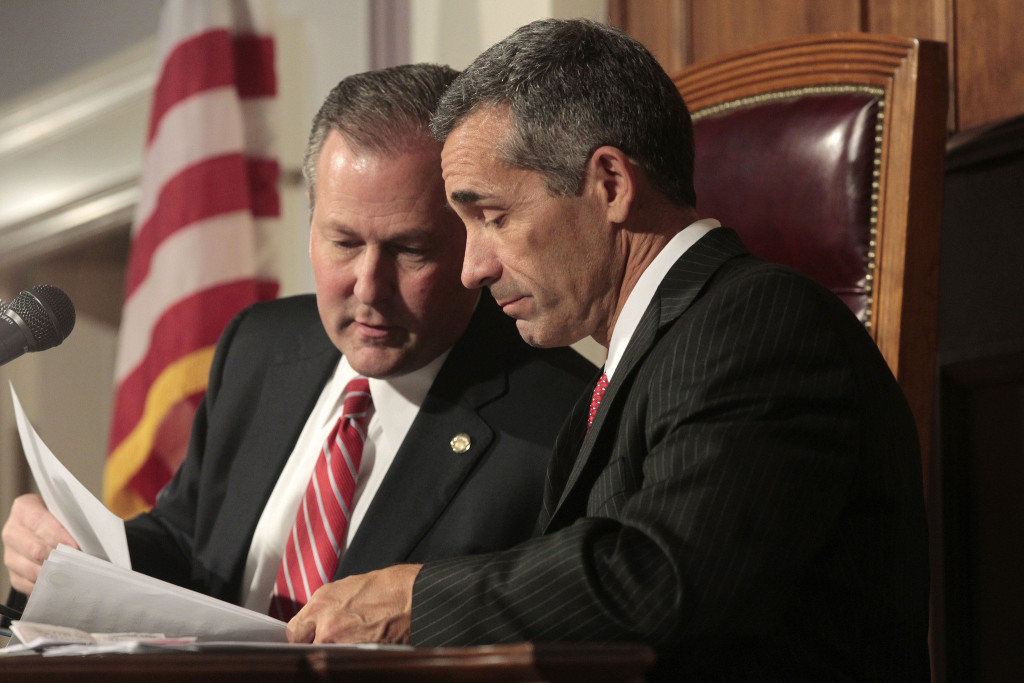
Both House Speaker Mike Hubbard (R-Auburn) and Senate Pro Tem Del Marsh (R-Anniston) seemed enthused by the amount of work accomplished in their respective chambers this week. The scene in the House was often more heated than that in the Senate, as House members took up several key Republican agenda items while Senators toiled away at a pile of Sunset Law bills. “I think it was a very productive week,” Hubbard said, praising the work of House Republicans in passing issues important to the party. Among the bills which cleared the House this week were a bill enshrining Alabama’s status as a “Right-to-Work” state in the constitution. The House also passed the “Unborn Infants Dignity of Life Act” and the “Uniform Wage and Right-to-Work Act.” All three bills faced stiff opposition from House Democrats, with the “Right-to-Work Act” from Rep. Arnold Mooney (R-Shelby) even facing defeat earlier in the session. Hubbard is looking at beginning work on the General Fund and Education Trust Fund budgets as early as next week, as well as a bill that would make Alabama the first state in the nation to provide all of its schools with internet access. Marsh echoed most of Hubbard‘s statements. “It was a great week,” Marsh said. “I think we got a great start.” Marsh praised Senators for passing a wide array of Sunset Law bills with little difficulty and a calendar which limited the amount of controversial bills coming up for discussion in the early weeks of the session. Marsh noted that it is his intention to address budget issues next week as well, along with those bills which passed through the House and Senate committees this week. Many of the bills which created discontent among Democrats in the House will likely face the same fate in the Senate, including the bill to prohibit municipal minimum wage increases from Rep. David Faulkner (R-Jefferson), which Marsh had no comment on. Hubbard, who opposes the institution of a state lottery, also hopes to see language added to the lottery bill from Rep. Alan Harper (R-Northport) to indicate where profits from the perceived lottery would be directed.
House members request federal probe into Mike Hubbard ethics trial

More than 35 Alabama legislators, both Republican and Democrat, have signed on to a letter urging U.S. Attorney General Loretta Lynch and U.S. Attorney for the Middle District of Alabama George Beck to open a U.S. Department of Justice investigation into aspects of House Speaker Mike Hubbard‘s ethics trial. According to the letter, Miles M. “Matt” Hart, an attorney in the office of Alabama Attorney General Luther Strange, has been allowed to “improperly use a grand jury” in efforts against Hubbard. Further, the letter claims that Hart has provided “selective information” commandeered through the grand jury to a political opponent of Hubbard. The letter lays out a twisted tale of corruption based on testimony from attorney Baron Coleman. Coleman was an organizer and consultant with the campaign of Sandy Toomer, who ran against Hubbard in 2014. According to Coleman, Hart provided him with “confidential grand jury information” to be used against Hubbard during that campaign. Coleman claims that he had between 50 and 100 conversations with Hart and used the information discussed therein to create a “whisper campaign” in Hubbard’s home district, Lee County. Coleman specifies that he was provided with the identities of persons appearing before the grand jury, assurances that the jury would indict Hubbard and that the Attorney General’s office had sufficient information to “counter any perceived prejudice or trouble inside the office.” The “assurances” occurred before the grand jury finished hearing testimony and Coleman claims that “each piece of information came from Matt Hart and was provided to the citizens of Lee County” by Coleman and others who believed the information to be factual. The letter goes on to say that Hart threatened to bring Coleman before a grand jury if he ever revealed that he had “a pipeline of information out of the Attorney General’s office.” Further, Coleman claims that when he was subpoenaed by Hubbard’s defense team Hart offered to work with him on answers to “potential questions regarding Speaker Hubbard, the grand jury proceedings” and more. The letter goes on to call into question the timing of Hubbard’s indictments, which occurred only two weeks before his re-election. “The timing of the indictments, coupled with Mr. Coleman’s sworn testimony and the statements if others … gives our members grave concerns that the Alabama Attorney General’s Office has used the power of its office in a coordinated effort to defeat Speaker Hubbard in his election,” the letter says. Though Strange has officially recused himself from “the matter regarding Speaker Hubbard,” and may not believe he has the power to “overrule, discipline, or investigate” Hart, the letter calls for an “unbiased investigation” to be made into the statements made by Coleman. “For the sake of all involved – including Speaker Hubbard, Mr. Hart, General Strange, and the citizens of Alabama – this matter and these claims should be thoroughly investigated by an unbiased body with the resources and experience to do so,” the letter states. “It is our hope that Attorney General Strange will join us in asking the Justice Department to conduct an investigation into these matters involving his office to ensure that the rights of Speaker Hubbard and all Alabama citizens, those rights guaranteed to us in the Constitution of the United States, are protected.” The Attorney General’s office did not immediately return requests for comment. Alabama Today has secured a copy of the letter sent to Lynch and Beck. Check out the full letter and affidavit below: Click to read full document and affidavit.
State House passes several Republican agenda items
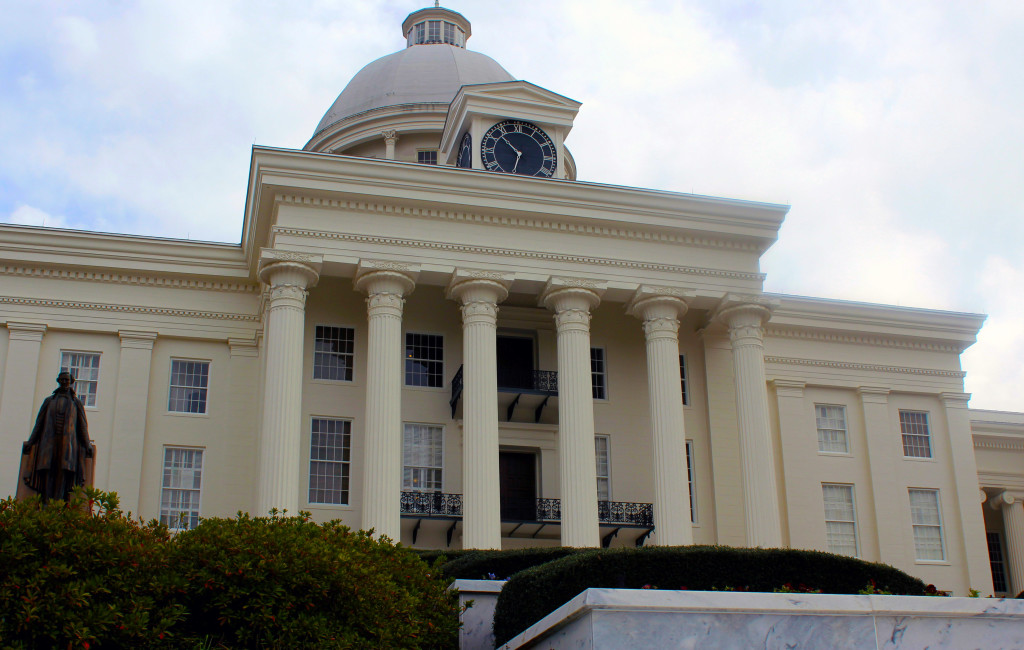
This week in the House has been one of heated and often lengthy debate, as House Republicans have brought several key agenda items to the floor and been railed against by House Democrats. On Tuesday, the contentious bill from Rep. David Faulkner (R-Jefferson) garnered hours of debate. The bill, known as the Uniform Wage and Right-to-Work Act, is designed to prohibit cities or counties from raising the minimum wage. The bill came into existence out of Birmingham’s recent moves to incrementally increase its minimum wage to $10.10 an hour. “We want to keep this state a pro-business, Right-to-Work state,” Faulkner said. “This bill will help to do that. This bill does not set, does not place a minimum wage level. It does preempt local efforts that attempt to raise the minimum wage and to provide other benefits.” Rep. Mike Hill (R-Shelby) was first to speak in favor of Faulkner’s bill, saying, “he was going to “start this filibuster off properly.” Hill noted that if one city is allowed to raise its minimum wage it will force others to do the same and create perpetual competition among municipalities. “I don’t know that I want to call this a filibuster as much as I want to call it an understanding of what we’re doing,” said Rep. A.J. McCampbell (D-Marengo). McCampbell’s opposition stemmed from the fact that Alabama legislators as a whole have, historically, held significant disdain for the overreach of the federal government. But, in McCampbell’s opinion, the state government is doing the same thing to city governments. “If you believe in home rule, then you have got to believe in home rule,” McCampbell said. “But if you believe a legislative body has more smarts than the people in these little cities, then we don’t need to be proclaiming and protesting when the federal government says ‘We are so much smarter than the people of Alabama.’ “ Debate continued on the bill for several hours before Republicans stymied filibuster efforts with a cloture vote. After the allotted 10 minutes, a vote was taken and the measure passed, largely along party lines. A bill from Rep. Arnold Mooney (R-Shelby) to enshrine Alabama’s status as a “Right-to-Work” state in the Alabama Constitution came up for reconsideration on Tuesday. The bill had previously failed to pass because many House Republicans were absent. The bill was taken up the next day and passed with limited debate. Before Mooney’s bill passed candidly, hearty debate surrounded the vote on a bill from Rep. April Weaver (R-Brierfield). The “Unborn Infants Dignity of Life Act” would outlaw the sale of fetal tissue and provide parents with the right to respectfully dispose of a child’s remains. Debate ensued, much of which centered around the fact that the sale of fetal tissue is already illegal and the Planned Parenthood videos that purported such sales have since been deemed illegal and inaccurate. Despite that, the bill passed along party lines.
Pope on Donald Trump: Anyone who wants border walls isn’t Christian

Asked about Donald Trump‘s views on immigration, Pope Francis said Thursday that anyone who wants to build a wall along the U.S.-Mexican border isn’t Christian. Trump, a leading U.S. Republican presidential candidate, has promised to build a wall along the Mexican border from Texas to California and expel 11 million people who are in the country illegally if elected president. The Pope’s comments en route home from Mexico came hours after he prayed at the Mexico-U.S. border for people who died trying to reach the United States. “A person who thinks only about building walls, wherever they may be, and not building bridges, is not Christian,” Francis said. “This is not in the Gospel.” Not having heard Trump’s border plans independently, Francis said he’d “give him the benefit of the doubt.” But he added: “I’d just say that this man is not Christian if he said it this way.” Texas Sen. Ted Cruz, another Republican presidential contender, has also supported building a border wall, and joked that he will make Trump pay for it. Trump, a Presbyterian, last week criticized Francis’ plans to pray at the border. He said the move was ill-informed and showed Francis to be a political figure being exploited by the Mexican government. “I don’t think he understands the danger of the open border that we have with Mexico,” Trump said in an interview with Fox News. “I think Mexico got him to do it because they want to keep the border just the way it is. They’re making a fortune, and we’re losing.” Asked if he felt he was being used as a pawn of Mexico, Francis said he didn’t know. “I leave that judgment to you, the people.” But he seemed quite pleased to hear that Trump had called him a “political” figure, noting that Aristotle had described the human being as a “political animal.” Republished with permission of the Associated Press.
Vote delayed on bill to streamline reinstatement of voting rights for felons
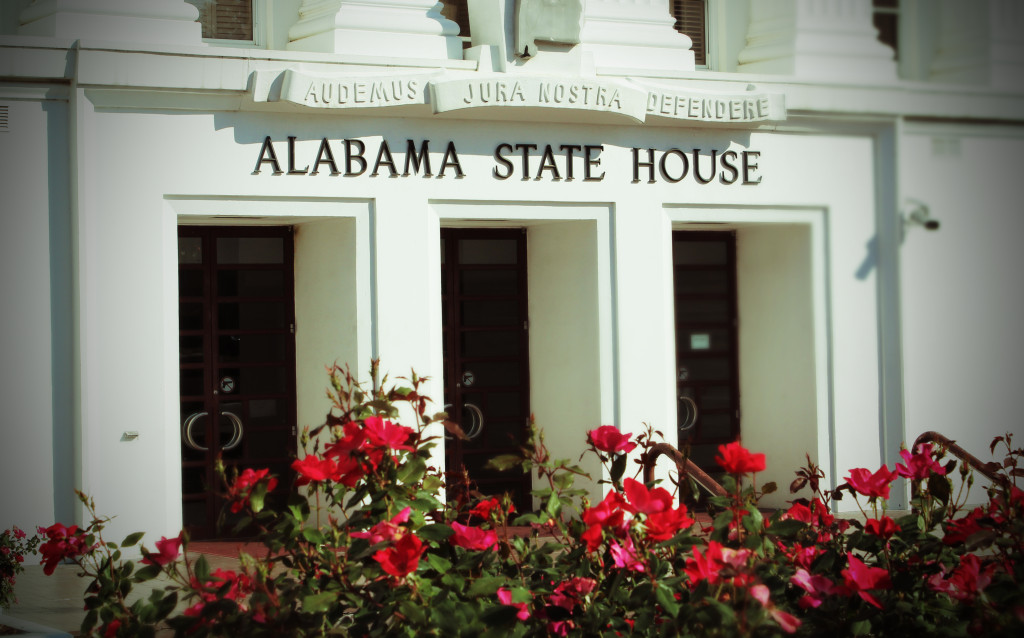
The Senate Committee on Constitution Ethics and Elections met Thursday morning, just before the start of the Senate session to take up several bills. First on this morning’s agenda was SB 10 from Sen. Gerald Allen (R-Tuscaloosa), which would call for an Article V Constitutional Convention to require Congress to balance the budget. The bill passed through the Senate last year but stalled in the House. Concern was voiced from several members of the committee, most based in the idea that calling for a convention may open Congress up to moving on issues wholly separate from that of balancing the budget. “If we think they’re disciplined enough to just look at this one thing, that’s not going to happen,” said Sen. Rodger Smitherman (D-Birmingham). Others disagreed, noting that the act of calling for a convention would act as an “awakening” to policymakers in Washington. “Ultimately Washington does listen and does pay attention,” said Sen. Trip Pittman (R-Montrose). “The best politicians in the nation are in Washington. I think it’s important in the process and survival of our Republic that this kind of system becomes viable.” The committee voted and gave the bill a favorable report. A favorable report was also given to SB 101, which makes a constitutional amendment requiring referendums be added to primary or general election ballots. The measure would theoretically cut costs in having to hold special elections for such items. Further, the committee OK’d a bill from Sen. Jim McClendon (R-Springville) to allow municipalities to enter into a pilot program replacing paper voter lists with electronic lists, likely held on a tablet. Voters would be able to swipe their ID card, sign and vote. The measure would likely save money, as the cost of purchasing a tablet is significantly less than the cost of printing the lists. SB 181, from Sen. Gerald Dial (R-Lineville), puts the idea of reorganizing the office of lieutenant governor and stripping that position of its control over the Senate before the people for a vote. In Dial’s opinion, such a move would free up the lieutenant governor to act more as an assistant governor and allow the Senate to elect its own president. “This is a destructive abolition of the lieutenant governor’s office,” said Sen. Phil Williams (R-Rainbow City), adding that it makes the office a “ceremonial position” only. Votes were tallied and Dial’s legislation failed to garner a favorable report. The most contentious issue up for debate at Thursday morning’s hearing was SB 186, which would streamline how felons’ voting rights are reinstated. “Obviously, I think there’s a reason you lose your rights,” Pittman said. “So I’m very hesitant to remove that.” Discussion was robust, as many noted the need to include the secretary of state in the process of drafting the bill more efficiently and lumping the bill with a similar piece of legislation that would more thoroughly define “moral turpitude,” crimes that now deny felons the ability to regain their rights. Smitherman objected. “This bill shouldn’t be contingent on waiting on some other bill to come,” Smitherman said. “That’s not acceptable to me. It’s a game of delay and shift around.” Eventually the decision was made to carry the bill over until next week when Coleman-Madison, as well as the secretary of state, will be in attendance for the discussion.
Email insights: New Alabama TV ads highlight Hillary Clinton’s fight for underserved communities
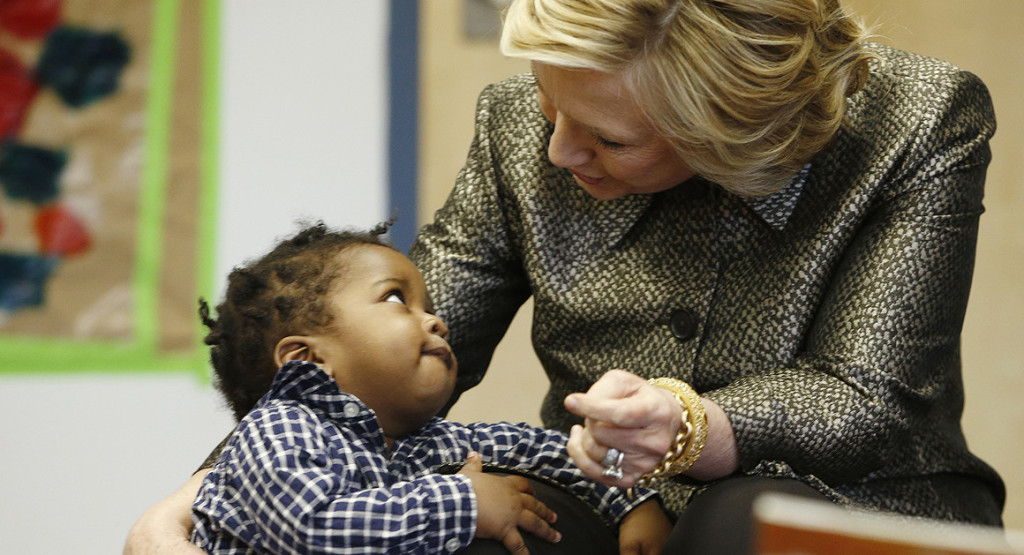
The Hillary Clinton campaign sent out an email Wednesday announcing its first two TV ads in Alabama. The first, titled “Broken,” targets African-Americans. In it, Clinton says racial inequalities need to be addressed and that “we have to face up to the hard truth of injustice and systemic racism.” “Something is just fundamentally broken when African-Americans are more likely to be arrested by police and sentenced to longer prison terms for doing the same thing that whites do,” Clinton says as the words “Fundamentally Broken” flash across the screen. The second ad, “For Us,” highlights Clinton’s record of fighting on behalf of American families. The new ads will start running Thursday in Montgomery, a Clinton consultant told Alabama Today. Clinton faces Democratic challenger Bernie Sanders in the March 1 SEC Primary where the two will vie for the state’s 58 delegates. Read the full email and watch the new two new ads below: Hillary for America today released its first two television ads in Alabama, including “For Us,” a new ad from the campaign that focuses on Hillary Clinton’s lifetime of fighting to achieve results for families. The ad highlights Clinton’s role in enacting the Children’s Health Insurance Program, which has provided insurance for 8 million kids, as well as her tenure as Secretary of State. It also emphasizes her commitment to raise the minimum wage, lower prescription drug costs, and ease the student debt burden. In the second ad, “Broken,” Hillary Clinton discusses the fundamentally broken criminal justice system that disproportionately hurts African American families. Clinton calls for investments in education, health care and jobs to “counter generations of neglect.” Since the beginning of the campaign, Clinton has said we have to come to terms with the hard truths about race and justice in America, and today she outlined her agenda to break down all the barriers holding Americans back and to combat systemic racism and build ladders of economic opportunity for African American families. The 30 second spots begin running in the Montgomery media market on Thursday. Watch “Broken” Watch “For Us”
In new ad, Nikki Haley says Marco Rubio will “bring a conscience to Republicans in Washington”
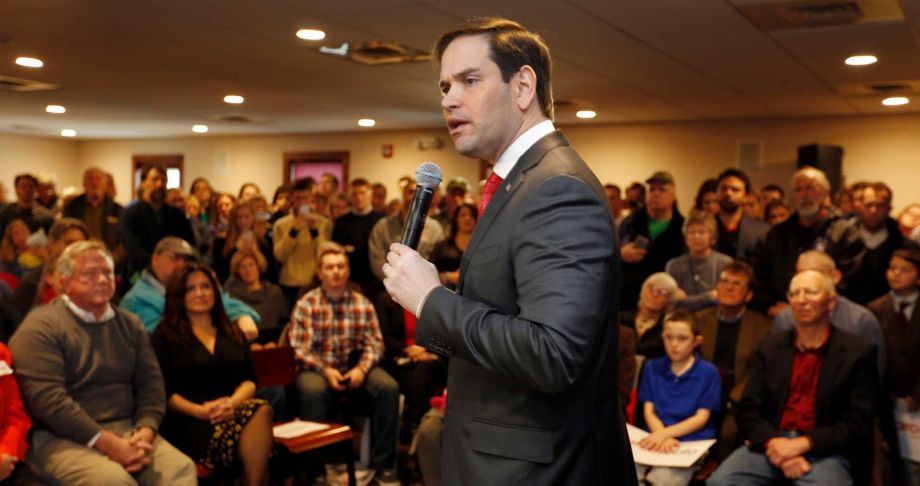
Marco Rubio is the best candidate to “keep America safe.” That’s the message South Carolina Gov. Nikki Haley is hoping to send to voters in a new advertisement released by the Rubio campaign. The advertisement comes just one day after the popular South Carolina Republican endorsed Rubio. “America can’t afford four more years like the last eight. That’s why I’m endorsing Marco Rubio for president. As the wife of a combat veteran, I know Marco will keep America safe,” she is shown saying in the 30-second spot. “And as your governor, I trust Marco to bring a conscience to Republicans in Washington and reign in our out-of- control federal government.” Haley goes on to say she is backing Rubio because “this election is about the future and the future is now.” The endorsement is expected to be a boost in South Carolina for Rubio. He’s in a battle with Ted Cruz for second in the Palmetto State. The endorsement also could mean bad news for former Florida Gov. Jeb Bush — who is in fourth in South Carolina, according to RealClearPolitics polling averages — who had hoped to get Haley’s backing. Bush told NBC’s Peter Alexander earlier this week that her endorsement “would be the most powerful, meaningful one in the state.” Haley is scheduled to hit the campaign trail with Rubio on Friday. The two are expected to be joined by U.S. Sen. Tim Scott and U.S. Rep. Trey Gowdy, both South Carolina Republicans. The South Carolina primary is Saturday.


